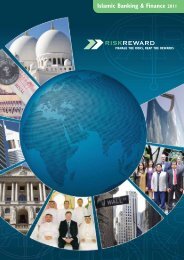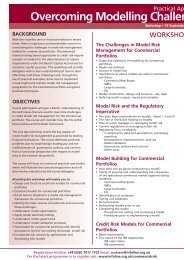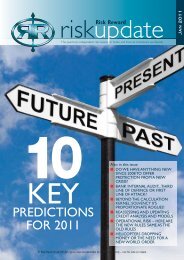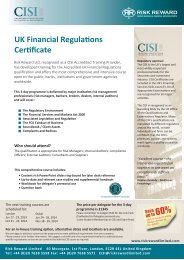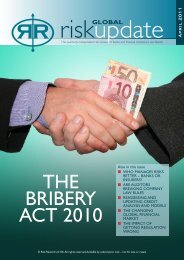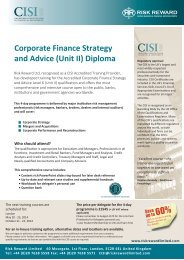Islamic Finance â an Introduction â Part III - Risk Reward Limited
Islamic Finance â an Introduction â Part III - Risk Reward Limited
Islamic Finance â an Introduction â Part III - Risk Reward Limited
You also want an ePaper? Increase the reach of your titles
YUMPU automatically turns print PDFs into web optimized ePapers that Google loves.
<strong>Risk</strong> Update 2010 – Q1<br />
agreed when they signed up (most don’t realise this by the<br />
way!), seems as remote as it c<strong>an</strong> ever be.<br />
The last question is “Am I getting the best return” to<br />
which the <strong>an</strong>swer is invariably “yes, of course”, because the<br />
<strong>an</strong>swer “no, the b<strong>an</strong>k down the road is more competitive th<strong>an</strong><br />
us!” might be career limiting!<br />
Once these three common questions are satisfied, most<br />
clients, I am told, are then happy to take nearly everything<br />
else on trust. Is this <strong>an</strong>y different from a conventional b<strong>an</strong>k<br />
Probably not in the case of the last two questions <strong>an</strong>d it<br />
me<strong>an</strong>s that just like <strong>an</strong>y fin<strong>an</strong>cial institution, <strong>an</strong> <strong>Islamic</strong> b<strong>an</strong>k’s<br />
cost of funds has to be set at a high enough level to attract<br />
new <strong>an</strong>d retain existing investments. This obviously me<strong>an</strong>s<br />
that on the other side of the bal<strong>an</strong>ce sheet the b<strong>an</strong>k must<br />
make investments (lo<strong>an</strong>s) at a higher level of projected return<br />
th<strong>an</strong> it pays for its source funds (deposits), to make a profit.<br />
So far, so good. But what is the easiest way in risk/reward<br />
terms to achieve this Well, by using the simplest <strong>an</strong>d most<br />
remunerative products which just so happen to be Murabaha<br />
<strong>an</strong>d Ijara!<br />
MURABAHA – AN ANCIENT CONTRACT<br />
Murabaha <strong>an</strong>d Ijara are two of six <strong>an</strong>cient trading contracts,<br />
which predate Islam itself <strong>an</strong>d are reckoned to be thous<strong>an</strong>ds<br />
of years old. Both have underpinned trading in the Middle<br />
<strong>an</strong>d Far East for millennia <strong>an</strong>d were adopted by the Prophet<br />
(PBUH) because they worked so well <strong>an</strong>d still do.<br />
Because Muslims may not charge interest but c<strong>an</strong> make a<br />
profit, the basic trade deal, the Murabaha, is a “cost plus”<br />
tr<strong>an</strong>saction in which the seller supplies goods to the buyer at<br />
a price which includes his disclosed costs plus a disclosed<br />
profit. When accepting the goods, the buyer agrees to the<br />
selling price <strong>an</strong>d is aware of how much profit is being made<br />
(the argument being he c<strong>an</strong> choose not to buy if he dislikes<br />
the price). If the buyer requires time to pay, then this c<strong>an</strong> be<br />
gr<strong>an</strong>ted, usually in return for a higher price including a bigger<br />
profit. This is one of the ways that the time value of money<br />
c<strong>an</strong> be covered under Islam without charging interest.<br />
Before the reader cries “fiddle”, let us consider some of the<br />
<strong>Islamic</strong> rules surrounding Murabaha tr<strong>an</strong>sactions which are<br />
designed to encourage fair trade. First the seller must own<br />
<strong>an</strong>d possess the goods which must be under his control. The<br />
goods must have a fungible value <strong>an</strong>d there must be no<br />
uncertainty about qu<strong>an</strong>tity, quality or delivery dates. The<br />
seller may not take adv<strong>an</strong>tage of the buyer, may not cheat,<br />
deliberately mislead, overcharge or be <strong>an</strong>ything other th<strong>an</strong><br />
scrupulously honest with him or her. Delivery <strong>an</strong>d tr<strong>an</strong>sfer of<br />
ownership must take place when the tr<strong>an</strong>saction is concluded.<br />
Once the deal has been done, it c<strong>an</strong>not be amended without<br />
the express approval of both sides. There is also the usual<br />
prohibition on trade in haram items (alcohol, guns, pork<br />
products etc.)<br />
These <strong>an</strong>cient Murabaha trading rules are clearly framed to<br />
avoid disputes or problems <strong>an</strong>d no doubt evolved over time.<br />
They were adopted by the Prophet (PBUH) because they<br />
worked so well. In fact a deal in which the seller has to be<br />
scrupulously honest <strong>an</strong>d reveal both his cost price <strong>an</strong>d his<br />
profit margin is remarkably refreshing to Western eyes where<br />
usually neither is disclosed.<br />
INTERNATIONAL DIFFERENCES<br />
Provided the rules set out above are followed, a Murabaha c<strong>an</strong><br />
be for almost <strong>an</strong>y amount <strong>an</strong>d in theory <strong>an</strong>y time period<br />
although the r<strong>an</strong>ge is usually 6 months to 10 years depending<br />
on the b<strong>an</strong>k which will also set minimum <strong>an</strong>d maximum lo<strong>an</strong><br />
amounts.<br />
So <strong>Islamic</strong> B<strong>an</strong>ks provide Murabaha facilities for clients who<br />
w<strong>an</strong>t to purchase almost <strong>an</strong>y item that qualifies. But there are<br />
some complications as a result of differing interpretations<br />
between Scholars which make the process slightly different<br />
even between b<strong>an</strong>ks based even in the same country. Take <strong>an</strong><br />
example of a client w<strong>an</strong>ting to purchase a car for US$ 30,000<br />
<strong>an</strong>d being offered 100% funding on a Murabaha over a 4 year<br />
period.<br />
For the tr<strong>an</strong>saction to be <strong>Islamic</strong>, the <strong>Islamic</strong> b<strong>an</strong>k must be<br />
the owner <strong>an</strong>d supplier of the car which me<strong>an</strong>s it must<br />
purchase <strong>an</strong>d take delivery from the supplier before selling to<br />
its client. This creates a delivery risk as the client could walk<br />
away before the tr<strong>an</strong>saction is complete. Some b<strong>an</strong>ks insist on<br />
a promise to complete from their client, others go further <strong>an</strong>d<br />
ask for a non refundable deposit (Arbun). Some <strong>Islamic</strong><br />
Scholars are happy with either a promise or <strong>an</strong> Arbun or both,<br />
others are not saying it is not <strong>Islamic</strong>. (Luckily <strong>an</strong>d at the risk<br />
of spoiling the story 99.99% of clients applying for funding do<br />
not walk away once the deal has been agreed!)<br />
The second point of difference is delivery. Some Scholars<br />
insist the <strong>Islamic</strong> b<strong>an</strong>k takes physical possession <strong>an</strong>d in our<br />
example must store the vehicle in a warehouse prior to<br />
delivery. Others are happy for ownership to pass on paper, in<br />
other words there is constructive delivery only.<br />
RETURNS ON MURABAHA – USUALLY HIGH<br />
Despite these differences, Murabaha s are priced at the<br />
higher end of the consumer funding scale <strong>an</strong>d use as<br />
benchmarks the appropriate EIBOR, SIBOR or other<br />
medium/long term rate measurement. The risk/reward profile<br />
is at the better end of the scale for the b<strong>an</strong>k, the tr<strong>an</strong>sactions<br />
are simple (albeit document hungry), easy to establish, c<strong>an</strong> be<br />
used for almost <strong>an</strong>y purpose, are simple to m<strong>an</strong>age <strong>an</strong>d<br />
normally well secured. So from the B<strong>an</strong>k’s viewpoint this is<br />
relatively easy high coupon lending.<br />
The only serious drawback is that the b<strong>an</strong>ks reward (profit<br />
margin ) must be fixed at the outset, when the Murabaha is<br />
agreed <strong>an</strong>d delivery concluded, so the returns have to be set<br />
high enough to absorb rate movements against the b<strong>an</strong>k.<br />
Either that or the portfolio must be turned over regularly so<br />
that the impact is diluted.<br />
NEXT ISSUE – PART 4<br />
In the next article we will consider Commodity Murabaha – a<br />
controversial product in some areas, but not in others <strong>an</strong>d<br />
Ijara.<br />
For further information please contact:<br />
Dennis Cox – CEO<br />
telephone: +44 (0)20 7638 5558<br />
email: DWC@riskrewardlimited.com<br />
Lisette Mermod – New York<br />
telephone: 1-914-619-5410<br />
email: LM@riskrewardlimited.com<br />
Jo<strong>an</strong>na Kraska – Public Relations<br />
telephone: +44 (0)20 7638 5558<br />
email: JK@riskrewardlimited.com<br />
3



